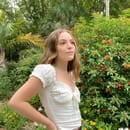As my time at USFSP comes to a close, I thought I should reflect on what truly made my college experience so memorable. Aside from dancing for the South Florida All Stars and writing for Her Campus, I also took a few classes that I found really interesting. Ironically, my favorite classes were not always in the same department as my political science major. While registering for classes, I made a conscious effort to select courses unrelated to my major so that I could expand my knowledge, and I certainly do not regret it.
Understanding Dance Experience
Since I am new to the dance world, this class was extremely beneficial to my dance journey. When I started this class, I had only been a dancer for less than two years. I had no idea how to choreograph and I could barely tell apart the various styles of dance, so this class was very eye-opening. Most of the lectures were about how the different genres of dance have developed over time. These lectures improved my familiarity with famous dancers such as Anna Pavlova as well as famous choreographers such as Bob Fosse. Also in this class, I watched a TED talk on how to choreograph and completed a few choreography assignments. This lecture and the following assignments helped me to improve both my choreography skills as well as my improvisational skills. I also received credit for participating in a beginner ballet class with ODC Dance Commons taught by a Julliard graduate. During this hour-long virtual class, I learned numerous ballet terms and realized that I am better at ballet than I thought I was. Not only did this class enhance my skills, but it also enhanced my love for dance.
Beaches and Coastal Environments
Who wouldn’t want to sign up for a class with the word “beach” in the title? I have never lived more than a half hour away from the shore in my entire life, and yet I barely knew anything about beaches until I took this class. Through long lectures and a field trip up the Pinellas County shoreline, I learned all about how various types of beaches are formed. I also learned about the global sand shortage and how governments have spent millions of dollars to reverse the natural process of beach migration. Even my favorite beach, Lido Beach in Sarasota, Florida, has been replenished 14 times within the last 50 years. This means that the state and local government paid millions for sand to be dredged up from the ocean and poured on to the shore, destroying the habitats of marine life in the process.
Schools and Society
As the course title suggests, this class was all about how schools affect society and vice versa. Every week the professor would assign readings that showed differing perspectives on an aspect of the educational system. I read arguments for and against public schools, charter schools, private schools, gifted programs, vocational education, home economics classes, affirmative action programs, standardized testing, and legislation that affected the education system in the U.S. Prior to this class, I had never even realized that some of these topics were so controversial. This was not a required class for my major, but I believe that it should be, since the education system is heavily influenced by politics and vice versa.
Environmental Ethics
This was the only ethics class that I have ever taken, so it was very challenging, yet educational. The class started with an overview of the major moral theories, including utilitarianism, natural law theory, divine command theory, and social contract theory. Some of the shorter readings were about how these theories could be applied to concepts as simple as veganism or collecting seashells. Most of the lectures were focused on analyzing the ethics and morality of how the government has responded to environmental disasters. Through lectures and a book entitled Extreme Cities by Ashley Dawson, I learned about how the government responded to Hurricane Katrina in New Orleans and Hurricane Sandy in New York City. The stories about Hurricane Sandy really resonated with me, since my parents’ hometown was affected by this disaster as well. Overall, the book explained that the government was more focused on money than they were on people in the aftermath of these major hurricanes.
Social Media Communications
My delusional self had anticipated for my small business to magically become a 6-figure success before I graduated, so with only a few months until my graduation and only a few sales per month, I signed up for this class with the hope to learn more about how to market my business on social media. So far in this class, I have realized that I skipped many crucial steps within the planning process of my social media marketing strategy. Through a group project, I learned that most of the social media communications process is planning for success. Before my group even created a post, we had to research copyright law, social media platforms, our target audience, and keywords for search engine optimization. I was surprised to learn that the demographics of the audiences of the major social media platforms are not what I assumed they were. This process may sound boring to some, but it is very useful information for any business owners or influencers in the class. I certainly will be applying these skills to grow my small business’s presence on social media.
My college experience is evidence that signing up for classes that are outside of your comfort zone can be more educational than only signing up for required classes. I found interest in a variety of subjects that I was not previously knowledgeable about. The new perspectives that I learned about have changed my outlook on society, art, and the environment.


